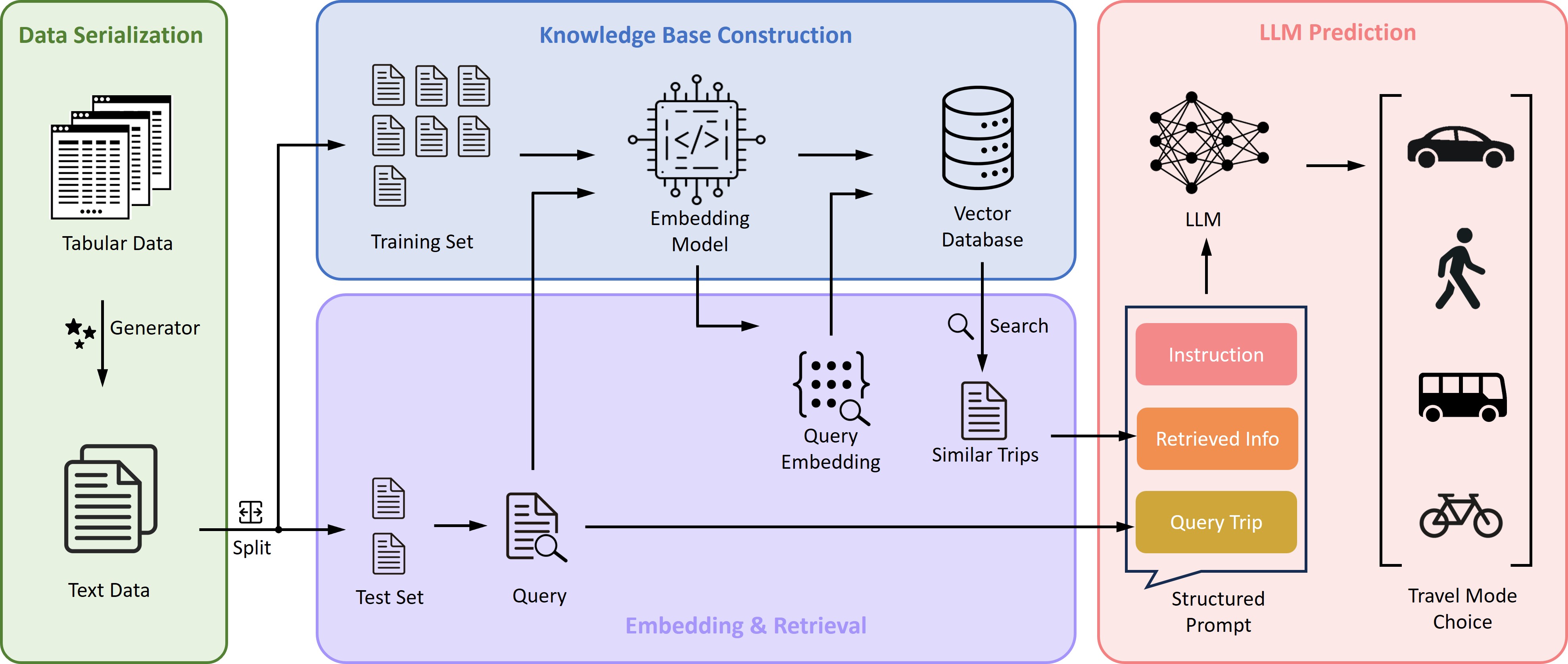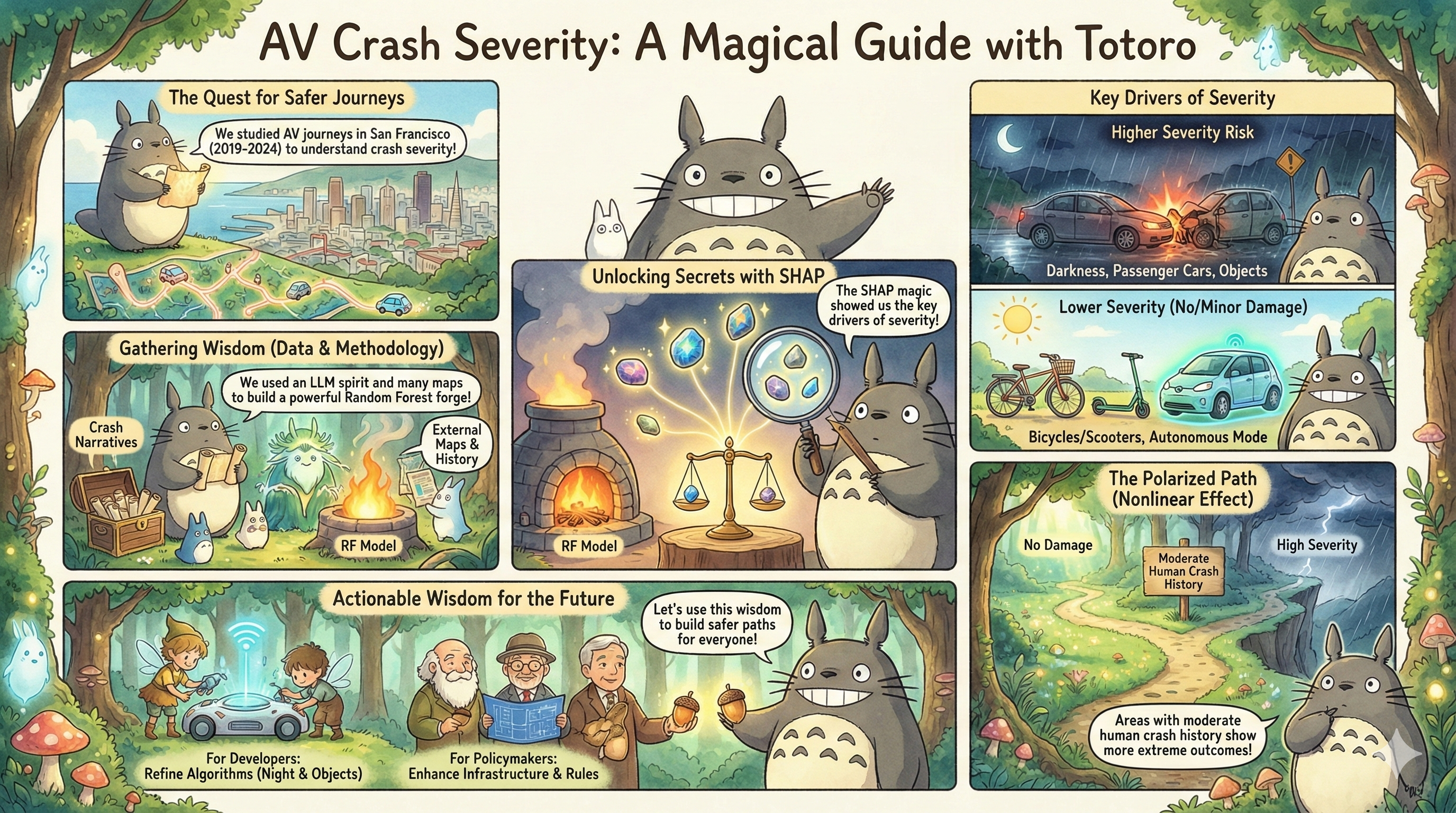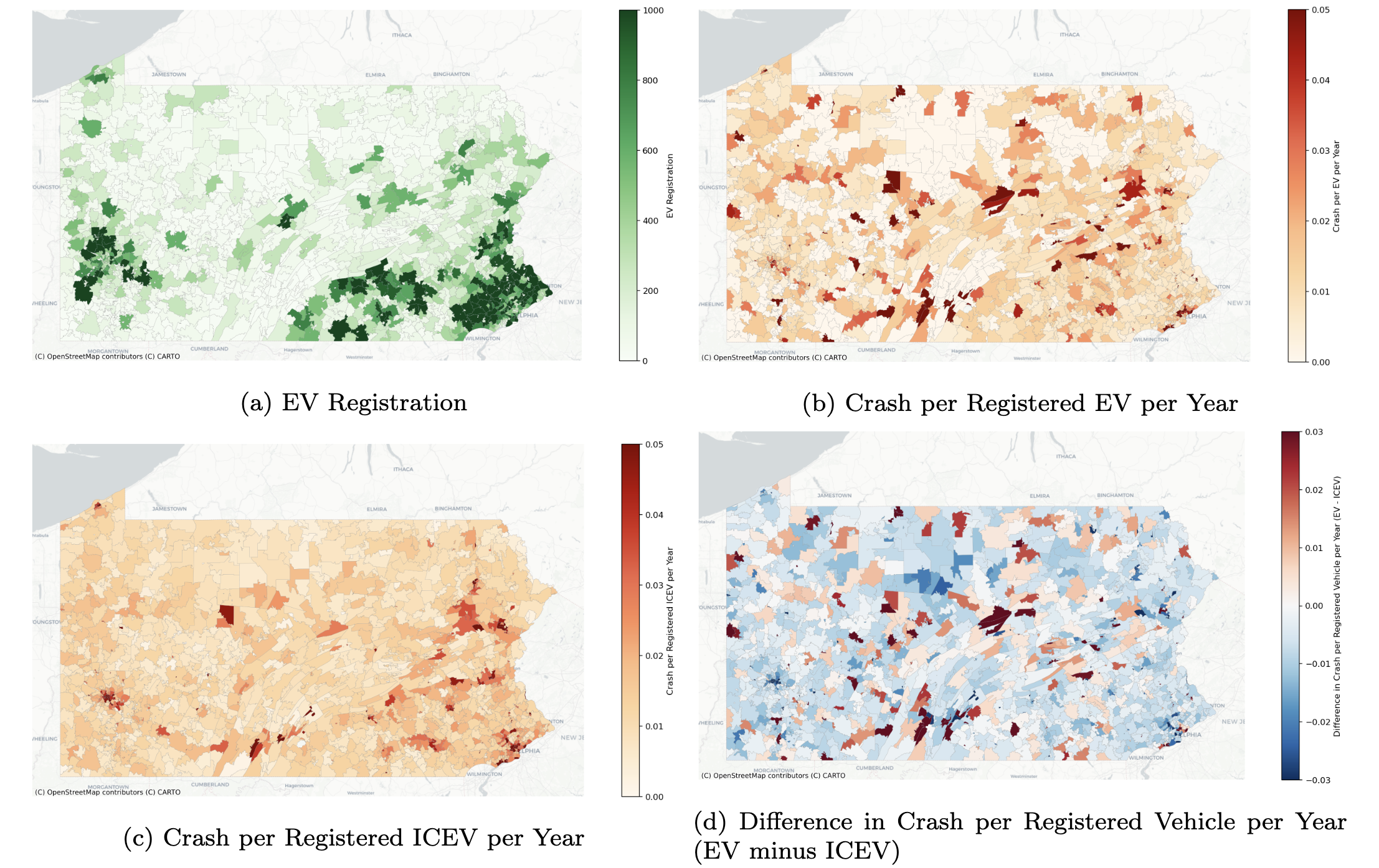Projects
LLM-Driven Travel Behavior Modeling: RAG for Predicting Trip Dynamics
May 2025 - Present, The University of Texas at Austin
- Developed a modular framework for integrating RAG into LLM-based travel mode choice prediction.
- Evaluate four retrieval strategies on three LLM architectures with different capability.
- RAG substantially enhances predictive accuracy across a range of models.

LLM-Agent for SUMO Simulation
Jan 2025 - Present, The University of Texas at Austin
- LLM-powered, web-based transportation simulation platform that integrates SUMO with the OpenAI Agents SDK and the Model Context Protocol (MCP).
- Enables natural language interaction, dynamic scenario editing, and AI-assisted decision support.
- Allows users to conversationally specify simulation tasks and control the simulation.
Autonomous Vehicle Accidents Analysis
Sep 2024 - Present, The University of Texas at Austin
- Utilized LLMs (GPT-4o) via the OpenAI API to extract key insights from autonomous vehicle (AV) accident reports.
- Conducted spatiotemporal analysis of AV accidents to identify trends and inform management strategies.
- Developed a Random Forest (RF) model to investigate factors contributing to crash severity.

(Generated by Google Gemini)
Electric Vehicle Safety and Crash Pattern Analysis
Mar 2024 - June 2025, The University of Texas at Austin
- Compared the spatiotemporal distribution, crash severity, and contributing factors between EV-involved crashes and other crashes.
- Developed an ordered logistic regression model to assess the impact of environmental, geographical, and human behavioral factors on EV crash severity.

Omniverse Isaac Sim and SUMO Co-Simulation
May 2025 - Sep 2025, The University of Texas at Austin
LLM for Emergency Preparedness
Jan 2024 - Present, The University of Texas at Austin
Funded by City of Austin
Collaborator: Moody College of Communication at The University of Texas at Austin
- Gathered corpus data through web scraping and inputting official documents.
- Fine-tuned an LLM model (LLaMA) on millions of QA pairs extracted from the City of Austin and government data.
- Developed a chatbot based on the fine-tuned LLM, complemented with a user-friendly web interface.
- Integrated multi-language chat functionality into the chatbot.
Digital Twin as Catalyst for Sustainable and Smart City
Aug 2023 - Dec 2024, The University of Texas at Austin
Partially funded by Center for Smart Transportation (CST), a Tier 1 University Transportation Center
Collaborator: DELL, MarkIII, NVIDIA
- Developed a web-based platform for real-time urban data publication and visualization, including transit, micromobility, traffic conditions and incidents, accessibility, and emergency.
- Created a 3D city model for Austin, TX on the Nvidia Omniverse platform. Visualized the city dynamics in 3D.
- Constructed an urban simulation model incorporating transportation, air pollution, noise, and facilities for Austin, TX.
Warehouse Digital Twin for Manufacturing Robot Simulation
Jun 2024 - Dec 2024, The University of Texas at Austin
Collaborator: DELL
Electric Vehicle Charging Accessibility Analysis
Feb 2024 - June 2025, The University of Texas at Austin
- Calculated accessibility measures for public electric vehicle charging stations in Austin, TX, and analyzed disparities.
- Assessed accessibility inequality using the Lorenz Curve, Gini Coefficient, Theil Index, Palma Ratio, and Segplot, and accessibility poverty through needs-gap analyses and FGT scores.
- Investigated egalitarian and sufficitarian philosophies in federal EV infrastructure programs, identifying misalignments in equity-focused policies.
Evolution of E-scooter Sharing in Austin, TX
Sep 2023 - Dec 2024, The University of Texas at Austin
- Developed a Random Forest (RF) model to analyze the influence of built environment and demographic variables on shared e-scooter usage in Austin, TX.
- Assessed the non-linear effects of variables on shared e-scooter trip frequency using Partial Dependence Plots (PDP).
- Explored the spatial heterogeneity of e-scooter’s relationship with ridesourcing trips using the model interpretation method, Shapley Additive Explanations (SHAP).
Real-Time Traffic Monitoring Using Transit Buses as Probes
July 2023 - Dec 2023, University of Florida
- Identified the distinct operational on/off-boarding events of bus fleets and estimated the average traffic speed for each road segment using GTFS Realtime data.
- Validated the estimated traffic speed using other data sources including Bluetooth and Google Maps data.
Shared Micromobility Demand Forecasting with Deep Learning
Jan 2021 - Aug 2023, University of Florida
- Formulated a novel spatiotemporal model using a Convolutional Neural Network (CNN) and interactive learning mechanisms to predict demand trends in shared micromobility services.
- Developed a deep learning framework using Transformer and Graph Convolutional Network (GCN) to forecast travel demand for dockless scooter-sharing systems.
- Applied the proposed models on real-world datasets in Washington, D.C., Austin, TX, and Chicago, IL. The proposed models achieved over 25% improvement in prediction accuracy compared with benchmark models.
Evacuation Behavior Analysis using Large-Scale GPS Data
Jan 2021 - Aug 2022, University of Florida
- Developed methods to infer and analyze the evacuation behavior (i.e., evacuation decision, destination, route choice) of residents during wildfire events using large-scale GPS data.
- Explored key factors associated with residents’ evacuation decisions and their effects on evacuation compliance rate in Sonoma County, CA during the 2019 Kincade Fire.
- Developed a deep learning model that incorporates Graph Convolutional Network (GCN) and Gated Recurrent Unit (GRU) to forecast spatiotemporal trip generation during wildfire evacuation.
Micromobility as a Solution to Reduce Urban Traffic Congestion
Mar 2020 - Aug 2021, University of Florida
- Scraped real-time micromobility services data and developed algorithms to infer micromobility trip origins and destinations based on real-time system status data.
- Analyzed the spatial and temporal usage patterns of shared micromobility services in Washington, D.C.
- Investigated factors associated with shared micromobility usage, providing insights to aid policymakers’ decisions.
Interpretable Machine Learning on the Adoption of Ride-Splitting
Aug 2019 - Feb 2021, University of Florida
- Modeled ridesourcing users’ adoption of ride-splitting services in Chicago using the Random Forest (RF) model.
- Identified key factors associated with model outcomes using Variable Importance.
- Analyzed nonlinear relationships between factors and outcomes using model interpretation methods, including Partial Dependence Plot and Accumulated Local Effects.
- Explored how understanding nonlinear patterns can assist professionals in managing and promoting ride-sharing.
Evaluation for Autonomous Vehicle Safety
Dec 2017 - Mar 2019, Tongji University
- Extracted critical driving scenarios from Shanghai naturalistic driving data for autonomous vehicle safety testing.
- Proposed an accelerated testing scheme for autonomous vehicle safety evaluation using the importance sampling technique. Achieved over 30 times acceleration compared with the Monte Carlo method.
- Designed a software-in-the-loop testing platform for autonomous vehicle testing based on the proposed test scheme.
Vehicle Turning Behavior Modeling at Mixed-Flow Intersections
Aug 2016 - Sep 2018, Tongji University
- Developed a quasi-two-dimensional model based on potential field theory to predict trajectories of turning vehicles.
- Evaluated the proposed model by reproducing trajectories of left-turn vehicles at a mixed-flow intersection in Shanghai.
Vehicle Cooperation Around Lane-Changing
Jun 2018 - Aug 2018, University of Massachusetts Lowell
- Identified lane-changing scenarios and extracted vehicle trajectories in lane-changing scenarios using NGSIM data.
- Explored vehicle cooperation before, during, and after lane-changing. Characterized and categorized cooperative lane-changing based on the behaviors of leading, ego, and following vehicles.
